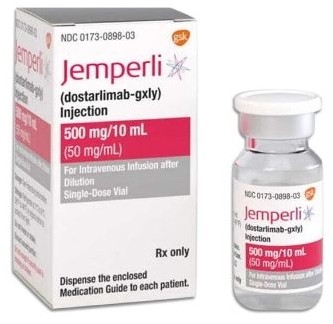GSK's anti-PD-1 immuno-oncology drug Jemperli (dostarlimab) has improved overall survival (OS) compared to first-line standard therapy in patients with advanced or recurrent DNA Mismatch Repair Deficient/Microsatellite Instability-High (dMMR/MSI-H) endometrial cancer.

GSK said Thursday that the second interim analysis of Part 1 of the RUBY study, a phase 3 trial of Jemperli, confirmed a statistically significant OS improvement. The study was published in June in the 35th issue of the Annals of Oncology, a journal of the European Society for Medical Oncology (ESMO).
The RUBY Study Part 1 is a global, randomized, double-blind, phase 3 study evaluating the Jemperli plus platinum-based chemotherapy (carboplatin plus paclitaxel) combination compared to a placebo plus platinum-based chemotherapy combination in adult patients with advanced or recurrent endometrial cancer.
The trial enrolled 494 patients with stage 3 or 4 advanced or recurrent endometrial cancer, of whom 118 had the dMMR/MSI-H biomarker. The primary endpoint of the first interim analysis was progression-free survival (PFS) and the primary endpoint of the second interim analysis was OS.
In the second interim analysis presented this time, the Jemperli combination therapy reduced the risk of death by 31 percent compared to control for all patients (HR=0.69; 95 percent CI, 0.54-0.89; P=0.0020). Among patients with dMMR/MSI-H endometrial cancer, the combination reduced the risk of death by 68 percent (HR=0.32; 95 percent CI, 0.17-0.63; P=0.0002) compared to control.
During a median estimated follow-up of 36.6 months, the dMMR/MSI-H Jemperli combination arm did not reach median overall survival, compared to a median overall survival of 31.4 months in the placebo arm.
In the dMMR/MSI-H endometrial cancer population at 24 months, the estimated probability of survival in the Jemperli combination arm using Kaplan-Meier analysis was 82.8 percent (95 percent CI, 69.5 percent-90.7 percent), 25.3 percentage points higher than the placebo arm of 57.5 percent (95 percent CI, 44.4 percent-68.6 percent).
The safety profile of the Jemperli combination was consistent with the primary interim analysis. The most commonly reported treatment-emergent adverse events (TEAEs) in both the Jemperli combination and placebo arms were chemotherapy-related. Anemia was seen in more than 40 percent of patients in the placebo arm, and except for anemia, most patients experienced grade 1 or 2 adverse events.
With this study, Jemperli confirmed the efficacy and safety of long-term treatment for more than three years in patients with advanced or recurrent dMMR/MSI-H endometrial cancer.
"In the past 20 years, RUBY is the only phase 3 clinical study to demonstrate a statistically significant improvement in overall survival compared to platinum-based monotherapy, the standard of care for first-line treatment in patients with advanced or recurrent endometrial cancer," said Yang Yoo-jin head of GSK Korea's Anticancer Business Division.
Jemperli is a PD-1 inhibitor approved by the Ministry of Food and Drug Safety in December 2022 for treating adult patients with recurrent or advanced dMMR/MSI-H endometrial cancer who are on or have progressed after prior platinum-based systemic chemotherapy. It is covered by health insurance for the same patient population.
In March, based on the results of the first interim analysis of Part 1 of the RUBY study, the drug won approval for an additional indication of first-line treatment in combination with platinum-based chemotherapy in adult patients with newly diagnosed advanced or recurrent dMMR/MSI-H endometrial cancer.
Related articles
- [Photo News] Leading pharma giants unveil cutting-edge oncology research at ASCO 2024
- GSK's Jemperli beats MSD's Keytruda to become 1st-line treatment for endometrial cancer in Korea
- 'GSK's immunotherapy Jemperli paves way for 2nd-line endometrial cancer treatment'
- Will FDA-designated endometrial cancer drug Jemperli become an innovative new drug in Korea?
- GSK Korea’s new myelofibrosis treatment wins approval
- GSK Korea expands indication for Jemperli in endometrial cancer treatment

